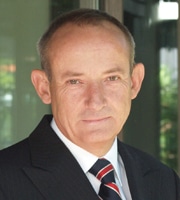Outgoing United Nations climate chief Yvo de Boer sent an urgent message to wealthy industrialized nations on Tuesday reminding them about previous promises to help the world’s poorer nations to adapt to a changing world due to global warming. Without a firm show of funds, he said the pursuit of a global climate agreement would remain a question mark for many as the December COP-16 talks in Cancun grow closer.
de Boer urged the industrialized nations to quickly present the $30 billion in aid they have pledged to deliver over the 2010-2012 period to help poor nations fight climate change impacts such as increasingly severe droughts and floods.
“Times are harsh, especially in Europe, but $10 billion a year for three years from all industrialized countries is not an impossible call,” he said.
World leaders failed to deliver a legally binding agreement to address global warming at the COP-15 talks in Copenhagen last year, coming up with only a nonbinding political document called the Copenhagen Accord.
“Cancun can deliver if promises of help are kept and if promises to compromise are honored in the negotiations,” de Boer said.
de Boer reiterated today that negotiators need to focus on a “concrete and realistic goal” for the Cancun climate summit in December, noting that “higher political guidance is required to find ways forward.”
While he does not expect a global treaty to emerge out of COP-16, de Boer strongly believes “a full, operational architecture to implement effective, collective climate action” can be put in place to ensure a global agreement is forged in 2011.
But, in order to build trust needed between rich and poor nations, the first installments of promised adaptation and mitigation assistance funds should be delivered as soon as possible.
“If developing countries are given the ways and means to act on all aspects of mitigation and adaptation, it will establish firm ground for bigger ambition,” de Boer said according to the Associated Press.
Aid to poor nations is expected to rise from the initial $10 billion a year to an annual $100 billion by 2020, although industrialized nations have not detailed how they would generate that level of funding.
Negotiators will meet in Bonn starting May 31 for two weeks of talks to continue work on draft text for a new international climate treaty that would take effect after 2012 when the Kyoto Protocol expires.
de Boer, who resigns his post by July 1, will be replaced by Costa Rican climate expert Christiana Figueres, who was appointed by U.N. Secretary-General Ban Ki-moon to succeed him.
Subscribe to our newsletter
Stay up to date with DeSmog news and alerts






